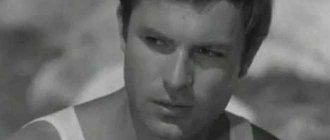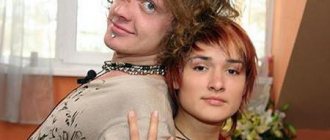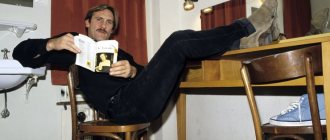Why does the biography of Grigory Rasputin attract attention even 100 years after his death? In this article we will look at the life story of a man who changed Russia.
was a simple Russian peasant, but there was something unusual about him: he claimed to have mystical healing powers.
Rasputin created his own cult and manipulated members of the Romanov royal family into believing he was a saint. And he succeeded - for a long time, Rasputin used his influence on the Russian government, and his decisions pushed the Romanov dynasty to the fall.
He claimed that he was torn between the forces of good and evil, but many priests argued that Rasputin's power was not from God at all, but from the devil.
After reading to the end, you will learn:
- Interesting facts from the biography of Grigory Rasputin;
- What was the relationship between Rasputin and the royal family?
- What was the fate of Rasputin?
Early years of Rasputin's life
Grigory Rasputin was probably born on January 20, 1869 in the Siberian village of Pokrovskoye. For many years, Siberia was the place where all Russian criminals and people disliked by the government were sent. It was very difficult to survive in the Siberian climate while doing hard work.
Gregory was the eighth child of his parents, but he grew up without brothers and sisters - they all died during childbirth or in early childhood. While still very young, Rasputin claimed that angels appeared to him in a dream and told him that he would be able to see the future.
Gregory could tell about his neighbors what no one could know; he healed sick horses without touching them. Gradually, people in the village began to talk about his mystical gift.
Some believed that Rasputin was touched by God, while others believed that he could be connected with the devil. The latter was more likely to be true, since in his youth Rasputin behaved... dissolutely.
Death
The last years of her life, Rasputin’s daughter lived in Los Angeles, not far from the legendary Hollywood. She received a substantial Social Security benefit and lived to almost 80, outliving her brother and sister by almost half a century.
Matryona Grigorievna Rasputina in Los Angeles | Photochronograph
Matryona Rasputina died of a heart attack in the fall of 1977 and was buried in the Angel Rosedale cemetery. The grandchildren of the daughter of the infamous Elder still live in France and the USA, some of them regularly visit Russia.
Rasputin's youth
At the age of 28 he got married and had four children. However, Rasputin was not a decent family man: he cheated on his wife and drank a lot.
One day he stole a horse, but instead of repenting, he hid from punishment in a local monastery and stayed there for several months.
The monks convinced him to “find God” and take the path of goodness, and a man named Macarius became his mentor. Then Rasputin left his family and decided to become a monk to preach Christianity while traveling through Russian villages.
Historians believe that Rasputin, spending a lot of time walking through the Siberian forest and preaching, encountered a cult called the Khlysty.
The Khlysty sect is an offshoot of the Russian Orthodox Church, and many of its members used to hold Sunday mass in the forest. They believed that salvation could only be achieved through cleansing from sin.
At purification ceremonies, they strangled each other until they lost consciousness, spun, danced, worked themselves into a frenzy, and then fell to the ground. After this, mass orgies began.
When Rasputin returned to his village to his wife and children, he became a completely different person: his eyes looked with frightening power, and his divine visions became brighter than ever.
Rasputin used the basement of his house as a meeting place for the Khlysty, where he continued to organize "cleansing" orgies.
Rasputin in St. Petersburg
One day, Rasputin stated that the Virgin Mary appeared to him and told him to go to St. Petersburg to help the royal family.
The idea that the royal family could need the help of a peasant from Siberia was completely insane. So, how did a man like Grigory Rasputin get into the royal palace?
It turned out that Rasputin's mentor Macarius was a former religious adviser to the Romanovs. Gregory used Macarius's connections to meet noble people of that time.
Macarius even sent a letter of recommendation to one of his friends in St. Petersburg, in which he asked to accept Rasputin for a while.
On his way to the city, Rasputin met Bishop Hermogenes and a priest named Sergei Trufanov, better known as Iliodor. The clergy were shocked by the appearance of Rasputin: he was disheveled and smelled terrible.
But as soon as Hermogenes and Iliodorus witnessed Gregory's healing abilities, they called him a saint.
Later, he became friends with princesses Milica and Anastasia of Montenegro, who managed to marry into the Romanov family.
They were both passionate about mysticism and the occult. They were often treated as outcasts by the aristocracy, so they contacted Rasputin and took him under their wing. So the life of Grigory Rasputin took a new turn.
Music
The arrival in Moscow was a real turn of fate for the Siberian girl. It was the capital that recognized her vocal talents, which turned out to be very popular among the public. In 1982, the girl became a soloist of the ensemble, which often performed in the resort city of Sochi. In Moscow, Ageeva met her husband and wonderful producer Vladimir Ermakov, whose mentoring and advice helped the young Siberian take her first steps towards popularity.
Singer Masha Rasputina
As a person who devoted a lot of time to studying show business and the customs of the capital, Ermakov first began to create a stage image of his wife. It was he who suggested the stage name under which she is known throughout Russia - Masha Rasputina. The image very clearly hinted at the performer’s Siberian roots and her deep connection with Russian culture. The first performances of the new singer Masha Rasputina were first given to the capital's restaurants. Working in such establishments allowed the girl to earn money, as well as learn how to behave on stage and communicate with the public.
1988 was a turning point in Masha’s fate and career; she recorded her first song, “Play, Musician!” to the words and music of the young composer Igor Mateta, whom the singer met thanks to her husband. The composition turned out to be a hit; it was first performed on the TV program “Morning Mail” and instantly won the hearts of thousands of people who reacted very favorably to the vocal resident of Siberia. In 1989, the song “Play, Musician!” ensured Rasputina's victory in her first serious festival, Pyongyang 89.
Composers vying with each other began to offer her their works, and poets sent Masha their poems, which, in their opinion, were worthy of her performance. The most fruitful was the union of the singer and poet Leonid Derbenev, whose lyrics fit perfectly into the style of Masha’s performance. In the future, their cooperation will give the world many hits, which will again and again raise Rasputin to the pedestal of fame.
In 1990, the performer began recording her first full-length album. Derbenev wrote the lyrics for her, while Masha worked hard on her perfect vocal performance. In order not to lose sight, Rasputina continued to attend festivals and was a frequent guest at her poet’s creative evenings.
In 1991, the record was completely ready and was called “Urban Crazy”. Masha appeared before the audience as a rebel from the Russian hinterland, who without hesitation sings songs on very controversial and even taboo topics; she is not afraid to point out the corruption of officials and the injustice happening in the country. Two songs turned out to be especially memorable for listeners: “Himalayas” and “Music is Spinning,” which brought success to the entire album.
After a stunning debut in Russia, the singer set her sights on the foreign market. Her exotic image and origins could well have contributed to her breakthrough on the European and American stage. Masha's producer approached this issue very carefully; the singer's new album used very high-quality arrangements that correspond to the current musical fashion. The record was called “I Was Born in Siberia”, but the songs were sung in Russian.
Perhaps this was the reason for the very cool attitude from the world community. But the record made a very strong impression on the Russian-speaking population. Several songs, including the title track “I was born in Siberia,” became hits again.
Masha Rasputina
Rasputina released several more albums and continued to successfully tour the country until the birth of her daughter. With a new addition to the family, the singer began to devote all her time to the child, which had a negative impact on her concert activities - she practically stopped performing, but did not give up recording albums. The last album before a three-year career break was “Live, Country!”, full of lyrical texts. It was then that Alla changed her passport and officially became Masha Rasputina.
Her grand return to the stage took place thanks to the song “Tea Rose,” sung in a duet with the cult Russian performer Philip Kirkorov. The composition instantly became a hit, soaring to the first positions of the Russian charts. The composition “Dreams,” again performed with Kirkorov, enjoyed no less success. In fact, it was he who returned Rasputin to the top of the Russian Olympus.
Masha Rasputina and Philip Kirkorov
In 2008, the singer released the album “Masha Rasputina. The Best", which collected the best works of Rasputina throughout her musical career, as well as hits of recent years.
Rasputin and the royal family
This was ideal timing for Rasputin because Tsarina Alexandra Romanova had just lost her confessor, Philip. She believed that he helped her and Tsar Nicholas conceive their only son and heir. On his deathbed, Philip declared that very soon another Saint would take his place.
Almost immediately after the death of Philip, Militsa and Anastasia introduced Rasputin to the Tsar and Tsarina. When Alexandra heard stories about Rasputin's miraculous abilities, she knew she wanted him to help Tsarevich Alexei.
The prince was born with hemophilia, a disease that prevents blood from clotting. This meant that even a small scratch on the prince’s body could lead to large blood loss.
Of course, the queen did not tell Rasputin about the illness at the first meeting: it was a secret. Alexandra thought for a long time whether she could trust this peasant from Siberia.
But one day, when Alexei fell and cut his knee, and the bleeding could not be stopped, Rasputin appeared at the royal palace demanding to see the boy. He said that he had a vision from God - without him the prince would die.
Grigory Rasputin and the royal family
He most likely learned this information from the Montenegrin sisters, but the royal family and servants were impressed by how quickly he came to the rescue.
Rasputin was allowed to see the prince. As soon as he entered the chambers, he ordered the doctors to leave so that he could heal the prince without anyone else using his magical powers. Almost immediately, Alexei’s wound stopped bleeding - this was enough to convince Alexandra of Rasputin’s holiness.
Modern scientists and historians believe that the reason for this was not magic, but that Rasputin forbade doctors to give the boy aspirin, which thins the blood and aggravates hemophilia.
Within a few months, Rasputin became a frequent guest at the palace of the Romanov family. It is believed that he began giving the king drugs such as opium, morphine and cocaine, claiming that they would help with his ailments.
The Tsarina suffered from migraines and anxiety, Rasputin also helped her relieve pain and relax.
Rasputin called Alexandra and Nikolai “mom” and “dad,” read bedtime stories to their children, and said evening prayers with them.
This worried the nanny very much because the older daughters were at the age of puberty. However, the Tsarina trusted Rasputin so much that she refused to listen to any concerns about him.
It was clear that Rasputin could get away with almost anything.
Cult of Rasputin
Rasputin lived in an apartment in St. Petersburg, where his followers came to meet with him. All these women gathered around the table with Rasputin sitting at the head.
He sat in silence, but after a while he suddenly began to mutter something. The women immediately fell silent, hoping to understand what he was trying to say.
Provided by SendPulse
Grigory took pieces of paper and desperately wrote down his thoughts. For some crazy reason, this really attracted his fans, they even considered him a second Christ, and at the end of the party they gave themselves to him in the bedroom.
One of his students, Olga Lokhtina, believed in him so much that she left her husband and children to live in his apartment. She forced everyone to refer to him as "God".
It is known that Rasputin hired prostitutes almost every day and brought them to the bathhouse. However, he still smelled disgusting - they did not wash in the bathhouse. He took the girl to a separate room, beat her with a leather belt, literally knocking the sin of promiscuity out of her soul, and then had sex with her.
There were many rumors about Grigory Rasputin. Witnesses described how Rasputin emerged from the bathhouse holding his head and shouting that he had seen the devil and that angels and demons were fighting for his soul.
It is obvious that he not only “treated” his charges with drugs, but he himself was addicted to them.
Two old acquaintances of Gregory, Hermogenes and Iliodor, did not like the fact that Rasputin was shouting about demons in public, because they were the ones who brought him into St. Petersburg society.
Hermogenes and Iliodor accused Rasputin that his healing powers came from the devil, and not from God. They beat him as badly as he beat the prostitutes in the bathhouse. However, Rasputin went to the queen for protection.
Hermogenes and Iliodorus were accused of attempted murder and sent into exile. At the same time, Rasputin decided that he needed a break from St. Petersburg and visited his native village in Siberia.
Hellboy and his world
Dmitry Zlotnitsky |
10/18/2012 | 4,049 This red-skinned demon smells like roasted peanuts, files his horns, wears a cross, and can kick some serious ass.
One of the adventures in the tabletop role-playing game Pathfinder is dedicated to the hunt for Rasputin. And Rasputin had every chance of becoming the main villain in one of Boris Akunin’s books. To convincingly describe Grishka, the writer carefully studied all the archives... and abandoned the idea. It turned out that the real Rasputin is not a great dark lord, but rather even a victim of court “showdowns” for power.
Rasputin, a supervillain from the comic book "Hellboy"
Failed attempt to assassinate Rasputin
The biography of Grigory Rasputin records several attempts on his life.
It turned out that Iliodor really tried to kill Rasputin. He was convinced that Gregory was the Antichrist, so he hired a disfigured prostitute named Khionia Guseva to kill him. She went to his village and one day began to wait for Rasputin near his house.
That day, Rasputin received a telegram and left the house to send a response to it by mail. Then he noticed the woman. He decided that she looked like the perfect “convert” and went over to give alms and preach the gospel to her.
When he got close enough, the woman stabbed him in the stomach several times, but Rasputin miraculously survived.
On the same day, Franz Ferdinand was assassinated and the First World War began. But Rasputin was not there to give advice to the Tsar and Tsarina - instead he was in a hospital in Siberia. Hearing the news of the coming war, Rasputin wrote a letter to the Tsar in which he begged him not to participate in it.
But the tsar did not want to listen to Rasputin. For the first time during Nicholas's reign, the people supported him. The Tsar left the royal palace and went to fight side by side with Russian soldiers.
Alexandra was left to rule alone, and after Rasputin returned, she made him her advisor. For two years, Rasputin personally appointed ministers and, one might say, led the country.
Brief biography of Grigory Rasputin (video 4 minutes)
Millions of Russian men died in the war. People struggled to find work, and the cost of bread was constantly rising. In addition, the queen trusted the madman. The Russian people had no choice but revolution.
Conspiracy and murder
Before committing the murder of Grigory Rasputin, his opponents tried to destroy him spiritually. He was accused of whipping, witchcraft, drunkenness, and depraved behavior. But Nicholas II did not want to take into account any arguments, since he firmly believed in the elder and continued to discuss all state secrets with him.
Therefore, in 1914, an “anti-Rasputin” conspiracy arose, initiated by Prince Felix Yusupov, Grand Duke Nikolai Nikolaevich Jr., who later became the commander-in-chief of all military forces of the Russian Empire during the First World War, and Vladimir Purishkevich, who was an actual state councilor at that time.
It was not possible to kill Grigory Rasputin the first time - he was seriously wounded in the village of Pokrovskoye by Khionia Guseva. During that period, while he was on the verge between life and death, Nicholas II decided to participate in the war and announced mobilization. At the same time, he continued to consult with the recovering seer about the correctness of his military actions, which again was not part of the plans of the royal ill-wishers.
Therefore, it was decided to bring the conspiracy against Rasputin to the end. On December 29 (new style), 1916, the elder was invited to the Palace of Prince Yusupov to meet with the famous beauty, the prince's wife Irina, who needed the healing help of Grigory Efimovich. There they began to treat him to food and drinks poisoned by poison, but potassium cyanide did not kill Rasputin, which forced the conspirators to shoot him.
After several shots in the back, the elder continued to fight for life and was even able to run out into the street, trying to hide from the killers. After a short chase, accompanied by gunfire, the healer fell to the ground and was severely beaten by his pursuers. Then the exhausted and beaten old man was tied up and thrown from the Petrovsky Bridge into the Neva. According to historians, once in the icy water, Rasputin died only a few hours later.
Nicholas II entrusted the investigation into the murder of Grigory Rasputin to the director of the Police Department, Alexei Vasiliev, who got on the “trail” of the killers of the healer. 2.5 months after the death of the elder, Emperor Nicholas II was overthrown from the throne, and the head of the new Provisional Government ordered a hasty end to the investigation into the Rasputin case.











